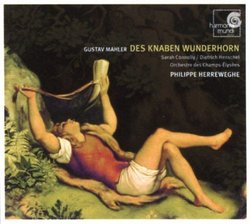| All Artists: Dietrich Henschel, Gustav Mahler, Philippe Herreweghe, Sarah Connolly, Orchestre des Champs-Élysées Title: Mahler: Des Knaben Wunderhorn Members Wishing: 0 Total Copies: 0 Label: Harmonia Mundi Fr. Original Release Date: 1/1/2006 Re-Release Date: 11/14/2006 Album Type: Import Genres: Pop, Classical Styles: Vocal Pop, Chamber Music, Historical Periods, Classical (c.1770-1830) Number of Discs: 1 SwapaCD Credits: 1 UPC: 794881804825 |
Search - Dietrich Henschel, Gustav Mahler, Philippe Herreweghe :: Mahler: Des Knaben Wunderhorn
 | Dietrich Henschel, Gustav Mahler, Philippe Herreweghe Mahler: Des Knaben Wunderhorn Genres: Pop, Classical
|
Larger Image |
CD Details |
CD ReviewsChamber musical leanness and finesse Pater Ecstaticus | Norway | 11/16/2006 (4 out of 5 stars) "Philippe Herreweghe has a well established reputation of excellence in music ranging from Renaissance to modern and also contemporary music. His recordings of Bach's Matthaeus- and Johannes-Passion are universally acclaimed. Alongside his recordings of the (Late) Romantics of Beethoven and Bruckner, Mahler has now also found a place in Herreweghe's repertory. (His otherwise wonderful recording of Schoenberg's transcription for chamber orchestra of Das Lied von der Erde must, I believe, ultimately be seen as a work by Schoenberg, not Mahler, and as such it `does not count', really.)
ABOUT THIS RECORDING. In the Netherlands this album has been awarded a '10' (A+) by a renowned critical review-magazine. Well, I assume the professional reviewer knows what he is talking about, and I guess he is right. (And besides, I am a complete musical amateur, and not even that, since I can't even read music.) Nevertheless, I too have my own personal tastes concerning this music, which is as dear to me as any other great music, so, if the reader would allow me, here follow my impressions and thoughts ... Firstly, there is a certain delicacy and leanness of orchestral phrasing in which all of the musical texture is brought out as on a finely detailed filigree canvas, with clear, nicely balanced recorded sound to match. I very much like a certain 'finesse' in Mahler's Des Knaben Wunderhorn, for example in the excellent recordings by the Berliner Philharmoniker under Claudio Abbado and the Vienna Philharmonic under Felix Prohaska (quite a `sleeper' as they say, this last one). All in all, this attention to detail, with this period instrument orchestra, is here stylishly done and often quite refreshing, and the string playing is especially gorgeous on these period instruments, but ultimately the playing sounds a bit `undernourished' for this repertoire to the ears of this particular listener (making me grab for the more voluminous, rounded sounds of the Concertgebouw Orchestra under Riccardo Chailly or the Berliner Philharmoniker under Claudio Abbado). It also sounds as if the string playing is downplayed somewhat in favor of woodwinds and brass, especially telling (and appropriate?) in for example `Wo die Schoenen Trompeten Blasen', but nevertheless, there also are episodes during which the (soft but warm period instrument) strings have the opportunity to really shine. The same is true for `Rheinlegendchen', a true test case for the string players as it were, and the string playing is indeed magnificent here: warmly sympathetic and finely attentive. THE SINGING is nice, although Dietrich Henschel's singing is not quite as beautiful or as distinctive and 'full' as that of Matthias Goerne or Thomas Quasthoff. It sometimes sounds as though Dietrich Henschel doesn't have enough air reserves and has to force out his vowels too much, making them sound too pronounced and strained. Or maybe he is just forcing the issue too much. (Here I would like to point out as a contrast Heinz Rehfuss' wonderfully natural, sympathetic singing under Felix Prohaska.) Sarah Connolly is an imaginative and fresh singer, but she doesn't really add new insights into this music, when, for example, compared with the deep emotionality of Anne Sofie von Otter, the purity and radiance of Barbara Bonney or the sympathetic warmth of Maureen Forrester (also under Prohaska). She does bring out the softer sentiments of sweet anticipation and longing in Urlicht wonderfully to my feeling, though. Nevertheless ... This recording is characterized by finely attentive playing that is so 'lean' and typical (period-instrumental timbres) that it is almost a shock to the ears sometimes - maybe even a little disenchanting (and as such a little disappointing). This can be a good sign in itself, inasmuch as it redefines our ideas about Mahler and it avoids `tradition'. But at the same time, for me, the playing often attracts so much attention to itself - the 'leanness' of the period instruments making every note and inflection clearly audible, making for a sound that to my ears does not 'blend' nicely -, that I find it difficult to wholeheartedly recommend this recording (let alone calling it a `top recommendation'), even though there is much top-notch music-making on this album, considering the gorgeous string playing in for example `Rheinlegendchen'. Also, it is a big plus that for this recording they have chosen not to split up the `roles' within songs between the singers in some of the songs, which Mahler never intended in the first place. This recording is quite a fresh, kind of no-nonsense approach to Mahler's songs for orchestra which is quite legitimate in itself, I think, but in the end I do miss some of the more rounded-out characterization and more deeply emotional engagement that I find in other recordings of Des Knaben Wunderhorn." |

 Track Listings (14) - Disc #1
Track Listings (14) - Disc #1